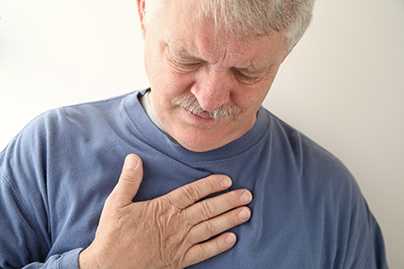Angina is chest pain due to decreased oxygen-rich blood flow to the heart. It is a common complaint among patients and a symptom of underlying coronary heart disease (CHD). Lifestyle factors play a major role in the development of CHD. A Nutritarian diet, rich in natural vegetation and low in animal products and processed foods, is critically important in the prevention and treatment of angina.

One third of Americans suffer from cardiovascular disease with approximately 7.8 million Americans experiencing angina to some degree. Among Americans ages 40-74, the prevalence of angina was higher among women than men.1
Typical angina symptoms include chest pain with exertion or emotional/physical stress. It can occur in the chest, neck, lower jaw, and down the left arm. The pain is usually described as discomfort more than pain but may be characterized as tightness, squeezing, constriction, pressure, heavy weight on chest, and even heartburn. It may be accompanied by nausea, vomiting, indigestion, sweating, dizziness, fatigue, and shortness of breath. Resting, sitting up, and/or use of anti-anginal medications usually alleviates the pain and accompanying symptoms. Unstable angina is chest pain that occurs at rest. This is usually an alarming symptom that needs immediate evaluation.
Angina is caused by atherosclerosis and inflammation of the heart’s blood vessels. Causes of cardiovascular disease are the same causes of angina. The primary causes are modern eating habits, smoking, and a sedentary lifestyle. The Standard American Diet leads to a constellation of dietary-caused risk factors including being overweight, diabetes/insulin resistance, high blood pressure, high cholesterol, and inflammation. The key to reversal of angina and lowering one’s risk of cardiovascular disease is a high nutrient, whole food, vegan or flexitarian-based diet plan that I call a Nutritarian diet.
Increasing exercise tolerance can lower oxygen requirement, improving angina symptoms. It also improves the risk factors associated with CVD, like high blood pressure, high cholesterol, and diabetes.1
ONLINE: All members of DrFuhrman.com can search the Ask the Doctor archives for discussions on this topic. Platinum and Diamond members can connect with Dr. Fuhrman by posting questions in the forum. Not a member? Join now.
IN PERSON: Book a stay at Dr. Fuhrman’s Eat to Live Retreat in San Diego, California. With options ranging from one, two and three months (and sometimes longer) you will be under Dr. Fuhrman’s direct medical supervision as you hit the “reset” button on your health. For more information: (949) 432-6295 or [email protected].
EVENTS: Join Dr. Fuhrman for an online boot camp, detox or other event. During these immersive online events, you’ll attend zoom lectures, follow a special meal plan, and have access to a special, live Q&A session with Dr. Fuhrman. Learn more about events.
The following are sample questions from the Ask the Doctor Community Platinum and higher members can post their health questions directly to Dr. Fuhrman. (All members can browse questions and answers.)
I’ve read a lot about the benefits of short bursts of high intensity exercise; studies show that it is safer and more effective at improving heart function in cardiac patients when compared to prolonged moderate intensity exercise. It recommends four minutes of exercise including short bursts of 30-90 second intervals of intense effort. I’m wondering if incorporating some of these short HIIT sessions into my week and cutting back on a few of the long gym sessions would be advisable and help me safely improve my angina symptoms.
The research is leaning towards high intensity interval training being the best for the heart and arteries, and the best part about this is that for those of us who have a tight schedule, you may be able to fit in a shorter duration of exercise if it is more intense. But even including light exercise regularly, such as having a nice long walk, is still therapeutic in other ways, too. Nevertheless, if you have significant heart disease, any exercise regimen has to begin very slowly, and intensity reduced. You should speak to your doctor to help you devise an exercise regimen safe for your heart condition and limitations.
I am a 57-year-old female and recently suffered a heart attack. I had a cardiac catheterization and was told there was no blockage. I am 5’3’, 125 pounds with total cholesterol of 120 - prior to the heart attack. I have been placed on a statin and a medication for my blood pressure. I was diagnosed with prinzmetal angina. Have you had experience with this type of angina resolving by following the Nutritarian diet style?
Yes, I have seen this type of angina resolve. It usually reflects plaque in the smaller vessels, and that spasm is occurring due to oxidative stress. Many heart attacks occur from clots forming in small vessels from juvenile plaque not visible with conventional cardiac testing. A plant-based, high nutrient density diet (or Nutritarian diet) is the most effective way to reduce inflammation, remove plaque, and prevent spasms in the small vessels.

Although his doctor diagnosed his medical issues signs of aging, Chris lost 34 pounds and his health problems disappeared... Read More
Results may vary.
Jerry was eager to get off the statin drugs which made him feel terrible; following Eat To Live his wish came true... Read More
Results may vary.